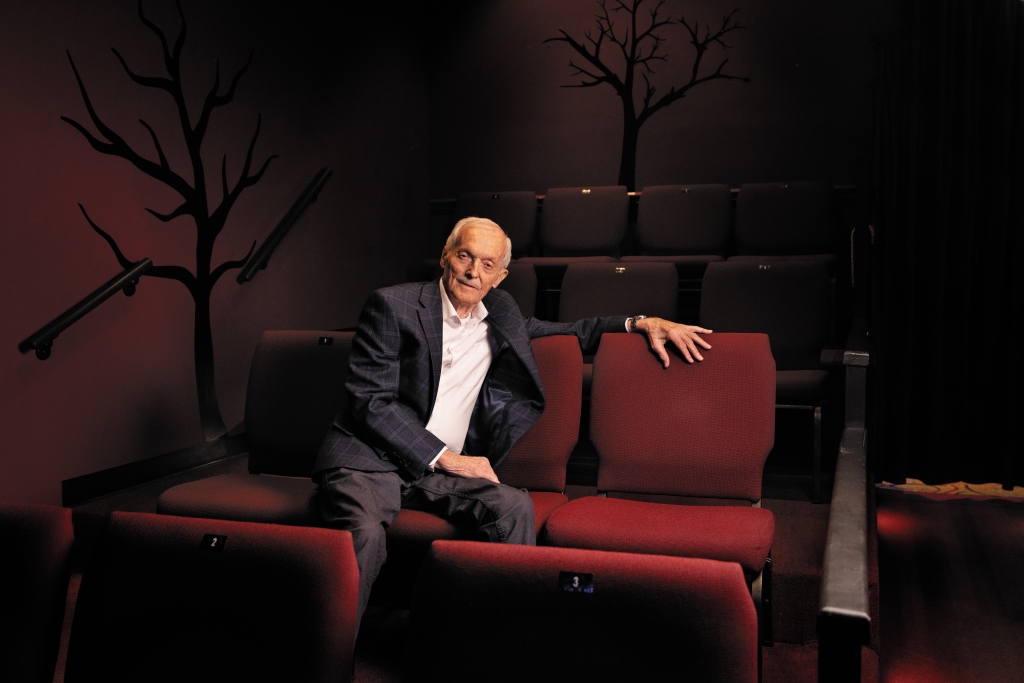From Russia with Love: Don Bluth Brings ‘Anastasia’ to Life Onstage

Writer Joseph J. Airdo // Photography by Loralei Lazurek
In a cozy theater tucked away in Scottsdale, animation legend Don Bluth leans forward in his seat, his eyes twinkling with the same creative spark that has illuminated countless movie screens over the past four decades. But today, his canvas isn’t celluloid — it’s the intimate stage of the Don Bluth Front Row Theatre, where he’s directing a cast of local actors in a production of “Anastasia: The Musical.”
The juxtaposition is striking: The grandeur of imperial Russia and the glitz of 1920s Paris, reimagined in this 75-seat venue. Yet as Bluth guides his actors through a scene, it’s clear that the magic that made the 1997 animated film a beloved classic is very much alive here in the Arizona desert.
At 86, Bluth is embarking on a new chapter in his storied career. The man who brought us “The Secret of NIMH,” “An American Tail” and “The Land Before Time” is now taking on live theater, returning to one of his most iconic works in the process. It’s a full-circle moment for the artist and a rare opportunity for Arizona audiences to experience his storytelling magic up close and personal.
“I would love to have done another animated film,” Bluth muses. “I think I still have the years in me to do it, but the money’s not there to do it. And I don’t know how to open that door.”
But for Bluth, the story has always been more important than the medium. And in “Anastasia,” he’s found a tale that continues to resonate, whether onscreen or onstage.
Resurrecting Romanov Royalty



The road to this production began more than 25 years ago, when Bluth and his team at Fox Animation Studios in Phoenix set out to create an animated feature that could compete with Disney’s dominance of the genre. The result was “Anastasia,” a sweeping historical fantasy loosely based on the legend of the lost Romanov princess.
“We went to Russia and tried to research as much as we could,” Bluth recalls. “And the stories that you read were so fascinating. Rasputin, my word. So many people didn’t like him politically, and they tried to kill him several times — poison, stabbing, everything — and couldn’t. He was a mysterious figure.”
The development of “Anastasia” was a labor of love for Bluth and his team. They spent countless hours researching Russian history, designing characters and crafting the film’s lush, romantic vision of early 20th-century Europe. The result was a visual feast, with stunning re-creations of St. Petersburg’s Winter Palace and the glittering streets of Paris.
But it wasn’t just the visuals that made “Anastasia” special. The film’s heart lay in its characters and their journeys. Anya, the amnesiac orphan who may or may not be the lost Princess Anastasia, resonated with audiences worldwide. Her quest for identity and belonging struck a chord with audiences of all ages.
The film was a hit, grossing more than $140 million worldwide and earning two Academy Award nominations. It also represented a high point for Fox Animation Studios, which sadly closed its doors just a few years later.
But the story of Anastasia was far from over. In 2017, a Broadway musical adaptation debuted, featuring a book by Terrence McNally and music by Stephen Flaherty and Lynn Ahrens. While it kept the bones of the animated film’s story, it made some significant changes, particularly to the villain.
“When Lynn Ahrens and Stephen Flaherty in New York decided they wanted to do a Broadway musical of the story, well, we couldn’t have a little white bat,” Bluth explains, referring to the animated film’s comic relief character, Bartok. “So everything had to change. The villain had to change.”
The result was a more grounded, historically based narrative that still maintained the romance and adventure of the original. The musical delves deeper into the political upheaval of the time, adding layers of complexity to the characters and their motivations.
“They wrote a different story, which was more adult in the way it approached things,” Bluth says. “If Russia really was changing, they killed off the Romanov family. If there was a rumor that said one of them escaped, then this guy, whom they called Gleb, was one who was climbing in the new regime.”
This new antagonist, Gleb, adds a compelling dimension to the story.
“He says, ‘OK, I’ll find her, and I’ll make sure that we finish the job,’“ Bluth explains. “Then what happens is he doesn’t know which one is Anastasia, but he sees a girl in the crowd, and he falls for her. Now we’ve got Dmitry falling for her, and we’ve got Gleb falling for her — two men after the same girl and for different reasons.”
And now, that Broadway adaptation is making its way to Scottsdale under the direction of the man who first brought Anastasia to animated life.
Reimagining Russia in the Desert



Staging a grand, globe-trotting musical in an intimate theater presents unique challenges, but Bluth sees it as an opportunity rather than an obstacle.
“I heard a few years back when ‘Camelot’ first came out on stage, somebody wrote a critique of it,” Bluth shares. “This critic said, ‘Well, I came out whistling the sets.’ And I thought, ‘Whistling the sets? Didn’t you see the play?’”
For Bluth, the key is focusing on the human elements of the story rather than getting lost in spectacle.
“If you talk about the human condition, and the audience feels that, it doesn’t matter how big or small the space is,” he says.
This production will feature 27 scene changes, accomplished through clever use of lighting and small set pieces. The international scope of the story — which takes audiences from St. Petersburg to Paris — will be conveyed through the performances and the music rather than elaborate backdrops.
The intimacy of the Don Bluth Front Row Theatre offers unique advantages. Audience members will be mere feet away from the performers, able to see every nuance of expression, every tear, every smile. This closeness creates an immersive experience that larger theaters simply can’t match.
“I would rather have a small theater and take a small group of people that you can help feel things deeply because they’re so close to the action,” Bluth says.
The costumes, too, play a crucial role in transporting the audience to another time and place. While they can’t match the lavish budgets of a Broadway production, Bluth and his team are focusing on key pieces that capture the essence of the era and the characters’ journeys.
Music, of course, is at the heart of this production. The score, with its lush orchestrations and soaring melodies, does much of the heavy lifting in creating the world of the story. From the haunting strains of “Once Upon a December” to the rousing “Journey to the Past,” the music of “Anastasia” serves as an emotional guide for the audience, evoking the grandeur of imperial Russia and the excitement of 1920s Paris.
Bluth’s approach to bringing imperial Russia to Scottsdale is a masterclass in the power of suggestion and the magic of theater. By focusing on the emotional truth of each moment, he’s creating a production that promises to be as sweeping and romantic as any Broadway spectacle while offering an intimacy and immediacy that only a small theater can provide.
Searching for Self



At its core, “Anastasia” is a story about identity, self-discovery and the power of love to transform us. These themes resonate deeply with Bluth, who sees parallels between Anastasia’s journey and his own artistic path.
Bluth’s journey to becoming one of animation’s most celebrated figures was far from straightforward. Born in El Paso, Texas, and raised on a dairy farm in Payson, Utah, Bluth discovered his passion for drawing at a young age.
“When I was younger, I always said I wanted to be an animator, to pursue art,” he recalls. “But my parents and every relative I’ve ever had said, ‘Don’t be ridiculous. You can’t earn any money doing that.’ They said, ‘Why don’t you become a dentist or a schoolteacher? People need schoolteachers.’ Nobody encouraged me to go for my dream.”
Despite this lack of support, Bluth persevered, driven by an inner conviction that this was his path.
“I listened to my own little guardian angel, who said, ‘Yeah, you can do this,’“ he explains.
This determination led Bluth to Disney, where he worked on classics like “Sleeping Beauty,” and later to form his own studio, producing beloved films like “The Secret of NIMH” and “An American Tail.” Throughout his career, Bluth has remained committed to pushing the boundaries of animation and telling stories that resonate on a deep, emotional level.
“The story of Anastasia parallels all that,” Bluth reflects. “Here’s someone who doesn’t know who she is. She has amnesia. She hasn’t a clue who she is, and she’s searching to find out who she is and whether she has a family. Every movie I’ve ever made is about finding family.”
For Bluth, storytelling is more than entertainment — it’s a way to help people understand themselves and their place in the world. He draws inspiration from child psychologist Bruno Bettelheim, who argued for the importance of fairy tales in child development.
“He said, ‘I must remind you to never explain to a child what the fairy tale means,’” Bluth explains. “‘That’s their private moment to find themselves, to look in the mirror.’”
This philosophy informs Bluth’s approach to directing “Anastasia.” He hopes audiences will find something of themselves in the story, just as he has throughout his career.
“When push comes to shove, Anastasia must make a decision: Go for the glory of being the daughter of the Romanovs, with all the wealth and fame that entails, or follow the con man she’s fallen in love with,” Bluth says. “Everyone faces this decision in their life: Will I follow the money, or will I follow my heart? That’s the message I hope the audience takes away. And if they do, then I’ve done my job.”
Drawing New Dreams



As opening night approaches, there’s a palpable sense of excitement both within the theater and in the broader Arizona arts community. For many, this production represents a unique convergence — a chance to see a Broadway-caliber musical in an incredibly intimate setting, directed by one of animation’s true visionaries.
“I want people to feel, not to just simply check off a box in their life,” Bluth says of his goals for the production. “I want them to feel good about being themselves. I don’t know them personally, so all I am is a storyteller. But it’s through stories that people can learn.”
For Bluth, who has spent a lifetime bringing fantastical worlds to life on screen, this foray into live theater feels like a natural evolution. It’s a chance to connect with audiences in a new way, to see the immediate impact of his storytelling in the faces of those seated just feet away from the action.
“I’ve been very, very blessed in my life,” Bluth reflects. “It’s like doors opened that I didn’t open. I’m sure I have a guardian angel.”
As the curtain prepares to rise on this new production of “Anastasia,” it’s clear that Bluth’s artistic journey is far from over. In bringing this tale of a lost princess to the Arizona stage, he’s not just revisiting a beloved story — he’s reminding us all of the transformative power of art, the importance of following our dreams and the universal human quest to discover who we truly are.
In a world that often feels divided, stories like “Anastasia” remind us of our shared humanity — our common hopes, fears and dreams. And in the hands of a master storyteller like Bluth, those universal truths shine brighter than ever, transcending borders and connecting us all in the timeless magic of once upon a time.
In “Anastasia,” and indeed in all of Bluth’s work, we find that open invitation to explore, to question, to dream. It’s an invitation that continues to resonate, from the silver screen to the stage, from St. Petersburg to Scottsdale, and beyond.
‘Anastasia: The Musical’
Sept. 12–Oct. 25 // Don Bluth Front Row Theatre // $40; discounts available for youth, students, seniors and groups of six or more // 480-314-0841 // donbluthfrontrowtheatre.com

